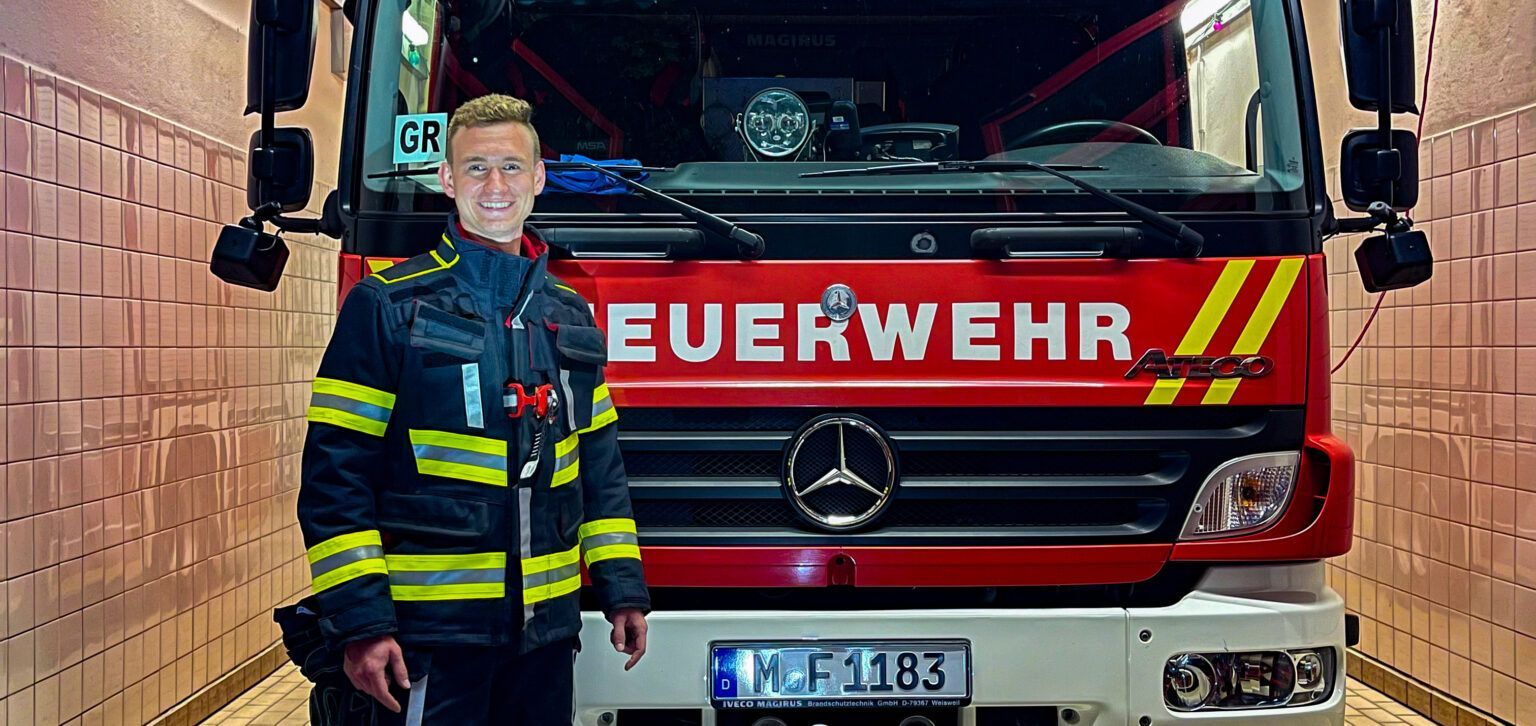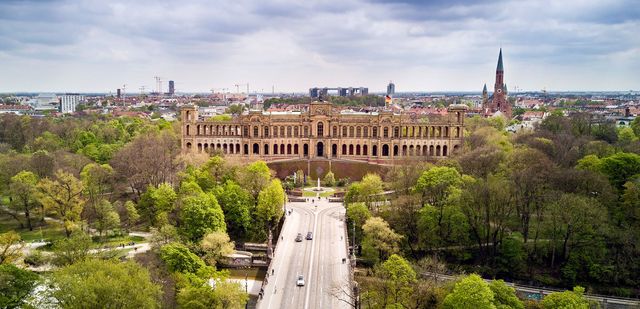My desire to shape politics has been driven by my voluntary work. I have been involved in the volunteer fire department and the student council.

You can achieve a lot with voluntary work to improve life for others and yourself. However, you always come up against political limits that cannot be overcome through commitment alone. I, for example, came up against such a limit during the negotiations on the Munich semester ticket. In the struggle over the ticket price, the final decision lay with the politicians. It is precisely these political framework conditions of our lives that I want to change in the Bavarian state parliament for an ecological, social, and secure future.
My path into politics
I grew up in the small village of Kalt. My interest in politics began at school. First as class representative and later as district student representative, I fought for the interests of my classmates.
At the same time, I was active in the volunteer fire department, because our safety is not just the job of a few but must be supported by many volunteers. After I moved to Munich to study chemistry, I continued my involvement in the student council as managing director and later as a student senator.
After completing my bachelor's degree, I was elected to the Bavarian state parliament for the first time and worked on Europe and in the committee of inquiry investigating the "mask deals" against corruption. Now, in my second term, I am returning to my commitment and am responsible for domestic policy. As Chairman of the Munich Green Party, I also always have my eye on the future of our state capital.
Why in the Bavarian state parliament?
Because it is close to the citizens. State politics accompanies us from daycare centers to schools and universities. With the police and emergency services, it guarantees a safe life in which our democracy can flourish. I want to directly improve people's everyday lives and make them more livable.
As spokesperson for home affairs and queer life, I stand for a strong constitutional state, transparency, and appreciation for all those who ensure our security daily. At the same time, I see our social diversity as one of Bavaria's key strengths.
When everyday life gets very stressful
I like to go hiking to clear my head. I appreciate the hikes through our Alps and also across to Austria and Switzerland, as they show that we can move freely across borders in Europe. If I don't have enough time, I keep fit with freeletics. I appreciate a good thriller or crime novel just as much as a cup of green tea. The volunteer campaign team in the constituency had my back during the election campaign, and now my reliable team in the parliamentary office is taking over this task.

Home Affairs
Internal security creates the framework in which our liberal democracy flourishes.
Thanks to our security authorities and emergency services, social coexistence in Bavaria works. A strong constitutional state that is committed to the welfare of the people needs well-equipped authorities with highly trained personnel. The burden on the police with additional tasks must therefore be reduced in favor of their core mission: averting danger and investigating crime.
The public's trust in the security authorities is based on transparency and control. With a police commissioner, I want to create an independent point of contact for police officers and citizens. I want to correct the regulations introduced by the CSU in the "Polizeiaufgabengesetz" to the detriment of civil rights. The Office for the Protection of the Constitution must protect our free democratic fundamental order from right-wing extremist groups and parties.
Through voluntary structures in firefighting, rescue and disaster control, many citizens are part of our security architecture. This commitment deserves appreciation. Unfortunately, attacks on rescue workers are on the increase. To continue to inspire fellow citizens to volunteer in the future, we must make it more attractive and prosecute assaults.
The state must provide more support for the refurbishment of fire stations and create more places at fire academies. Volunteers need more places on courses for further training. In the rescue service, salaries must be improved, and emergency paramedics must be allowed to make more independent decisions. The various organizations involved in disaster control are dependent on better coverage of their running costs. The equality of helpers and rescue workers must be established in all areas.
The crises of recent years have shown us that crisis prevention, exercises and cooperation between all stakeholders are the key to a resilient security architecture and society. Politics must make this possible. This requires investment and strong partnerships between the state level, the municipalities, and the federal organizations THW and Bundeswehr.

LGBTIQ* affairs
Bavaria is diverse. Bavaria is colorful. And this is precisely where its great strength lies.
Around ten percent of people in Bavaria feel that they belong to the LGBTIQ+ community and yet the word "queer" is still not on the Bavarian government's agenda.
To date, Bavaria is the only German state without an action plan for the acceptance of gender and sexual diversity. Hearings in the Bavarian state parliament, the study "Queer Life in Bavaria" and our inquiry have revealed the shortcomings. Every second queer person in Bavaria has experienced discrimination in the last three years and the number of reported queer-hostile crimes has increased tenfold since 2010. These are statistics that show that there is a need for political action.
On my "Queer through the country" tour, I met some impressive LGBTIQ* associations and initiatives. However, their funding is insufficient, while the demand for school projects and workshops to raise awareness among teachers and classmates is very high.
The demand cannot be met by the people working mostly on a voluntary basis. The full-time advisory network receives far too little support from the Free State. It was only thanks to our persistent efforts that we were able to get the first state funding.
I am fighting for Bavaria to have an action plan that promotes the acceptance of LGBTIQ*. From contact persons in the police force and educational projects in schools to a strong advisory network and comprehensive health services, the action plan must quickly implement concrete measures.
My parliamentary week
My political work is divided into parliamentary weeks and information weeks. During the parliamentary weeks, I focus on domestic and queer politics in the Bavarian state parliament. I use the information weeks for regional work in my constituencies of Hadern and Ebersberg.
Monday - For Munich in the Green City Council
My Monday is reserved for my work for the Munich Green Party. The city council, of which I am one of two chairmen, meets in the morning. In the afternoon, the Green city council group meets in the town hall. We work together to advance transport projects, invest in affordable housing and green urban design, for example.
Tuesday - team and working group
Tuesday is the most important working day for me. I discuss upcoming projects with my team in the parliamentary office. The most important advisory bodies within the parliamentary group for my parliamentary work meet in the working group and the home affairs team. This is where it is decided whether my motions and bills will be passed on to the committee and the plenary. The Bavarian state parliament's plenary session takes place on some Tuesdays. Then all MPs meet from 14:00 with an open end.
Wednesday - Home Affairs Day and group meeting
Wednesday is dominated by the Home Affairs Committee and the parliamentary group meeting. Here, together with the other Green MPs, I determine the position of the Green parliamentary group, decide on motions, and prepare the plenary sessions of the Bavarian state parliament. If the plenary session takes place on Wednesday, the parliamentary group meeting is brought forward to the morning and the plenary session begins at 13:00 without a fixed end.
Thursday - Plenary day
If the plenary session takes place on Thursday, it lasts the entire day from 09:00 to 18:00. All bills that are passed in the Bavarian state parliament first come to the plenary for a first reading. They are then discussed in the Bavarian state parliament's committees and then returned to the plenary for a second and, if necessary, third reading. At the end, there is a final vote in which the MPs rise from their seats. Only then does a bill become law.
Friday - For the region
There are no sessions in the Bavarian state parliament on Friday. I use Fridays to work on my own motions and questions. I also take care of regional work in my constituencies of Hadern and Ebersberg. To this end, I visit institutions and associations in the constituencies or offer events for the citizens myself.

